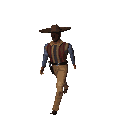Hosted free by tripod.com


Generally speaking, each person's caste is decided by the quality of the blood. Yet the least drop of Spanish blood, if it be only of quadroon or octoroon, is sufficient to raise one from the position of a serf, and entitle him to wear a suit of clothes - boots, hat, cloak, spurs, long knife, all complete, though coarse and dirty as may be - and to call himself Espanol, and to hold property, if he can get any.
The fondness for dress among the women is excessive, and is sometimes their ruin. Nothing is more common than to see a woman living in a house of only two rooms, with the ground for a floor, dressed in spangled satin shoes, silk gown, high comb, and gilt, if not gold, earrings and necklace.
[discussion of fine parties thrown when a girl turns fifteen years old]
Next to the love of dress, I was most struck with the fineness of the voices and beauty of the intonations of both sexes. Every common ruffian-looking fellow, with a slouched hat, blanket cloak, dirty under-dress, and soiled leather leggings, appeared to me to be speaking elegant Spanish. It was a pleasure simply to listen to the sound of the language, before I could attach any meaning to it. A common bullock-driver, on horseback, delivering a message, seemed to speak like an ambassador at a royal audience.
Another thing that surprised me was the quantity of silver in circulation. They have no credit system, no banks, and no way of investing money but in cattle. Besides silver, they have no circulating medium but hides, which the sailors call "California banknotes."
Richard Henry Dana, Two years Before the Mast
These people were naturally, whether rich or poor, of a proud nature, and though always exceedingly polite, courteous and friendly, they were possessed of a native dignity, which was apparent in their bearing, walk and general demeanor . . . . In my long intercourse with these people, extending over many years, I never knew any instance of incivility of any kind. . . . I never knew a case of dishonesty on their part. . . . They regarded their verbal promise as binding and sacred, relied upon their honor, and were always faithful."
Almost every visitor to our capital at Sacramento is impressed with the tall beauty of a row of Deodar pines that adorn the front of the grounds. ..... [The] man who supplied the seed for these exotic pines was Pierson B. Reading.
Perhaps here, a word about the Rancho Buena Ventura is in order. The path to the mansion wound through a grove of lovely oaks, and through a pair of high, white pillars up to a broad porch that fronted the great adobe dwelling. All about and carefully placed were numerous buildings and gardens. There were shops, stables, barred corrals and other necessary structures arranged appropriately and grouped as a compatible whole and all painted a harmonious white. The broad porch was furnished with easy chairs and the front door opened into a great reception room, carpeted with thick carpet and richly furnished. Above all there were books, lots of books.
Also, this was a house by the side of the road where Reading acted as a friend to man. It was located on the main road, north and south, and every night there shown [sic] out of the cupola a light so that the tired traveler might find food and warmth and rest and there were many for Reading was always hospitable. All were welcome and all were fed and cared for royally, be he high or low.
Many greats were entertained there: Joaquin Miller, John Bidwell, John Sutter, Peter Lassen, John C. Frémont, .....
Reading Springs (named for two ice cold springs that flowed there)-- Queen City of the north state.
Spanish terms and how so much of the mystique and allure of Old Spain, España vieja, entered our western idiom.
William Robert Shepherd:
The Hispanic Nations Of The New World : A Chronicle Of Our Southern Neighbors
Those of pure Spanish blood in early California formed the upper class, intermarrying and keeping up an exclusive system in every respect . . . .
William Heath Davis, concerning the Californios.
Davis records that these spanish-speaking Californians (before the coming of the yanquis) were "about the happiest and most contented people I ever saw, as also were the early foreigners who settled among them . . . .
Stephen G. Hust, This is my own, my native land. Yuba City CA: Independent Press, 1956.
Fort Reading, alongside Cow Creek [north of present day Dersch Road] was established 1852 and abandoned 1867.
Linguistically
Wintu language has been (or was) held to be a Penutian tongue.
White observers noted the Wintu proclivity to friendliness
economic resourcefulness, creativity, wide variety of uses from wide range of plants, animals, even minerals. Pre agricultural; not quite the demographic density necessary for it.
Still Petersen calls them a rather domesticated people.
Kroeber calls credits Wintu with comparatively greater social and cultural distinctives than the Yana.
Reading, by 1862 known as the best stock producer in California.


last save 12.23.11![]()
friend me (facebook)
site maintained by
Bob Shepherd